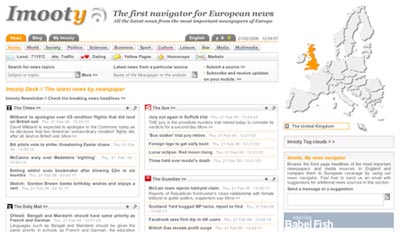Etan Smallman, a student journalist, is participating in the European Journalism Centre’s ‘Th!nk About It’ competition. Here, he shares his thoughts on this week’s launch event, held in Brussels. Etan blogs at studentjournalist.wordpress.com.
Over 80 bloggers and journalists descended on the Belgian capital last Monday for the launch of ‘Th!nk About It’, the first ever Europe-wide blogging competition.
The brainchild of the European Journalism Centre, we will all be blogging away until June, with the aim of throwing some much needed light on that most uncool of institutions, the European Union. Think of it as the blogging world’s Eurovision Song Contest.
At the two day launch in Brussels, we were treated to presentations by – among others – the BBC’s Europe editor, Mark Mardell, the Financial Times’ Brussels bureau chief, Tony Barber, and Belgian blogger extraordinaire Clo Willaerts.
Barber and Mardell confessed that their now successful blogs came into being not from an initial personal enthusiasm for blogging, but from above: “I was ordered to,” Barber admitted.
Using podcasts, vodcasts, photos and plain old fashioned text, representatives from all 27 EU member states, will be bringing their individual experiences to the new blogging fraternity.
The official site will be launched on February 1, when readers from across the globe will be able to get involved in the discussion, as well as vote for their favourite blogs. A high-tech bonanza of prizes, from Flip Cameras to iPhones, will be awarded throughout the competition.
For an event that involved bringing dozens of international competitors from all corners of the continent to one place, everything went sensationally smoothly. There was only one controversy.
“Why isn’t the wireless working in here?” a fellow blogger publicly demanded. “WE ARE BLOGGERS,” he exclaimed, as if it were the essence of his being, an article of faith.
I was worried it was all going get a bit heated when one candid British MEP said that he was proud to have a blog, but conceded (rather warily) that he has disabled the comments facility, therefore not allowing any discussion on the site: for fear of rival parties and political groups using it as a platform for their views.
“NO COMMENTS, NO BLOG!” a militant blogger boomed at him. And that was that.
Thankfully everything continued peacefully, though I sensed there were many who wanted to officially strip the gentleman of his self-appointed status as a ‘blogger.’
It was just left to Marjory van den Broeke, head of press at the Parliament, to wrap up the day by quoting one of the speakers who described us as:
“Lively, challenging, not too respectful, young, cool and attractive. Everything bloggers should be.”
And if that is not enough to convince you that the EU – for better or for worse – can be fun, then I urge you to visit my blog to see what Euro-bloggers get up to when they – just for a few minutes – prize themselves away from their beloved MacBooks.
Suffice to say: European relations at their most amusing.
Watch the competition’s trailer here:

